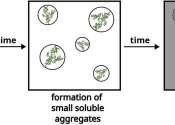eLife is a unique collaboration between funders and practitioners of research to communicate influential discoveries in the life and biomedical sciences in the most effective way. It is launched with support from the Howard Hughes Medical Institute, the Wellcome Trust, and the Max Planck Society in November 2012. eLife represents a new model of scientific publishing, designed to meet the needs of scientists in life sciences and biomedicine in a better way. This includes free, immediate, online access to scientific articles; rapid, fair, and constructive review; and innovation in content presentation – in short, a journal for scientists, run by scientists. Initial decisions are made by eLife’s senior editors, and, if a submission is selected for further assessment, full peer review is overseen by eLife’s 175-member board of reviewing editors. The reviewing editor and reviewers consult once peer review comments are submitted, and provide a consolidated list of instructions to authors – eliminating unnecessary and time-consuming rounds of revision.
- Publisher
- eLife Sciences Publications, Ltd
- Website
- http://www.elifesciences.org/
Some content from Wikipedia,
licensed under CC BY-SA









